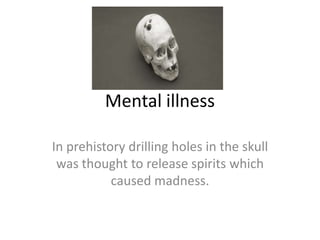SociologyExchange.co.uk Shared Resource
•Als PPTX, PDF herunterladen•
4 gefällt mir•3,378 views
Melden
Teilen
Melden
Teilen

Empfohlen
Empfohlen
Milan Systemic Family Therapy
Lecture 5 social constructionist family therapy: Milan school

Lecture 5 social constructionist family therapy: Milan schoolNewham College University Centre Stratford Newham
Weitere ähnliche Inhalte
Was ist angesagt?
Milan Systemic Family Therapy
Lecture 5 social constructionist family therapy: Milan school

Lecture 5 social constructionist family therapy: Milan schoolNewham College University Centre Stratford Newham
Was ist angesagt? (20)
Classificatory systems - Advantages & Disadvantages

Classificatory systems - Advantages & Disadvantages
Lecture 5 social constructionist family therapy: Milan school

Lecture 5 social constructionist family therapy: Milan school
Cognitive Level of Analysis: Cognition and Emotion

Cognitive Level of Analysis: Cognition and Emotion
Andere mochten auch
Andere mochten auch (16)
Sociology Essays - Mental health & illness within Sociology

Sociology Essays - Mental health & illness within Sociology
Ähnlich wie SociologyExchange.co.uk Shared Resource
Ähnlich wie SociologyExchange.co.uk Shared Resource (10)
IntroductionMental health conditions have effects regardless of .docx

IntroductionMental health conditions have effects regardless of .docx
Running head WHY IS THERE A STIGMA OF MENTAL HEALTH IN THE AF.docx

Running head WHY IS THERE A STIGMA OF MENTAL HEALTH IN THE AF.docx
Mehr von sociologyexchange.co.uk
Mehr von sociologyexchange.co.uk (20)
SociologyExchange.co.uk Shared Resource
- 1. Mental illness In prehistory drilling holes in the skull was thought to release spirits which caused madness.
- 2. Defining mental illness Medical/psychiatric model. ‘Abnormal behaviour’ is real illness which needs to be treated. Use of medication - anti-depressants like Prozac. 31 million prescriptions issued in 2006.
- 3. Social realism Mental illness is a medical problem which does exist and has observable symptoms. Pilgrim and Rodgers – classification of mental illness is possible although there are differences according to time period and culture.
- 4. Social constructionism. Mental illness in one culture doesn’t mean that it will be labelled as such in others. Becker – mental illness is socially constructed. There is no ‘truth’ about what is or isn’t a mental illness. Heroin use was normal in Victorian times, but its use today is illegal and indicates that the user has dropped out of society.
- 5. Interactionist perspective.Labelling The power of certain groups in society like doctors and psychiatrists to label less powerful groups in a negative way. ie) the mentally ill. Once a person is labelled as mentally ill, other people treat them differently. All they say and do is seen as a symptom of their mental illness. ie) Rosenhan’s study of pseudo-patients
- 6. Effects of labelling Thomas Scheff’66 - A person only gets a mental illness label when other people class their behaviour as abnormal. Szasz’ 73 – the way society reacts to the ‘madness’ label makes the person mentally ill.
- 7. Goffman’61- ‘mortification’ ‘Asylums’ - The career of a psychiatric patient. Patient’s identity is replaced by an institutional identity – hospital routines, removal of personal clothing, medication Doctors engage in spurious interaction. Patients accept their label. This is seen as the first sign of recovery.
- 8. Social factors causing mental illness. Working class people suffer the most mental illness because of stress caused by poverty. Women are six times more likely than men to suffer from depression. Feminists blame the triple shift ( housework, childcare, emotion work) BUT women seek help. Men don’t.
- 9. More social factors. Nazroo’97 says Black Afro-Caribbeans suffer more with depression. This may be caused by racism and educational underachievement. AND/OR negative labelling by doctors and psychiatrists. Older people are more likely to be labelled as mentally ill. Care homes are institutional environments which may cause people to be reliant on others and loose hope. This confirms the label of being mentally ill and carers engage in spurious interaction with them.
- 10. Questions How do labelling theorists view mental illness? Who has the power to label? What argument do feminists use to explain why more women suffer from mental illness? What is meant by the term spurious interaction? Give two reasons why African-Caribbeans are more likely to suffer poor mental health compared with other ethnic groups ? How has labelling theory been criticised? See Gove’82, p268 Collins
- 11. Key terms to define (p270), Collins) Career Presenting culture. Social constructionism Social realism.
- 12. Linking health and research methods. Green and Platt’04 – Studying stigma. Ques 1-5 p251 Collins. English longitudinal study of ageing. Ques 1-7 p257 Collins. Emma Rich ‘06 Research into how women manage anorexia. Ques 1-4 p269 Collins. HW essay: Assess the view that mental health is socially constructed. (20 marks)